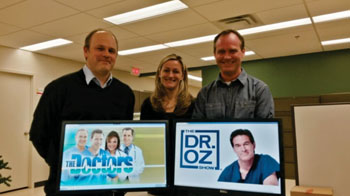Viewers Cautioned on Televised Medical Talk Show Recommendations
By HospiMedica International staff writers
Posted on 06 Jan 2015
A new study warns that the public should be skeptical of recommendations made on mainstream television medical talk shows, as they often lack adequate evidence or are contradicted by the best available evidence. Posted on 06 Jan 2015
Researchers at the University of Alberta (Edmonton, Canada) chose two internationally syndicated medical talk shows to analyze: The Dr. Oz Show and The Doctors. Each show was recorded every day from January 2013 to April 2013. The researchers then randomly selected 40 episodes of each show and had two team members watch every episode independently, recording topics, recommendations made, and who was making the recommendations. Two other researchers also watched the episodes and review the recommendations, focusing on benefits mentioned, if the magnitude of the benefit was quantified, costs, and conflict of interest.

Image: Study authors Mike Kolber, Christina Korownyck, and Mike Allan (Photo courtesy of the University of Alberta).
The researchers found evidence to support 54% of the 160 randomly selected recommendations (80 from each show). For The Dr. Oz Show, evidence supported 46%, contradicted 15%, and was not found for 39%. For The Doctors, evidence supported 63%, contradicted 14%, and was not found for 24%. Believable or somewhat believable evidence supported 33% of the recommendations on The Dr. Oz Show and 53% on The Doctors. The most common recommendation category on The Dr. Oz Show was dietary advice (39%) and on The Doctors was to consult a healthcare provider (18%).
Further findings included a specific benefit for 43% and 41% of the recommendations made on the shows respectively. The magnitude of benefit was described for 17% of the recommendations on The Dr. Oz Show and 11% on The Doctors. Disclosure of potential conflicts of interest accompanied only 0.4% of recommendations for both shows. The study was published in the Christmas edition of the British Medical Journal (BMJ), which was dedicated to media studies.
“Some patients come in and say 'I heard on Dr. Oz yesterday that we should all be doing this.' And then we're left scrambling in our office to try to find answers. It got us reflecting, what's being said there? What kinds of things are being recommended and what kind of information is being provided?” said lead author Christina Korownyk, MD, an associate professor in the department of family medicine. “Frequently you're not getting enough information and without doing the research you won't know if it's supported by evidence or not; the research supporting any of these recommendations is frequently absent, contradictory, or of poor quality.”
Related Links:
University of Alberta














